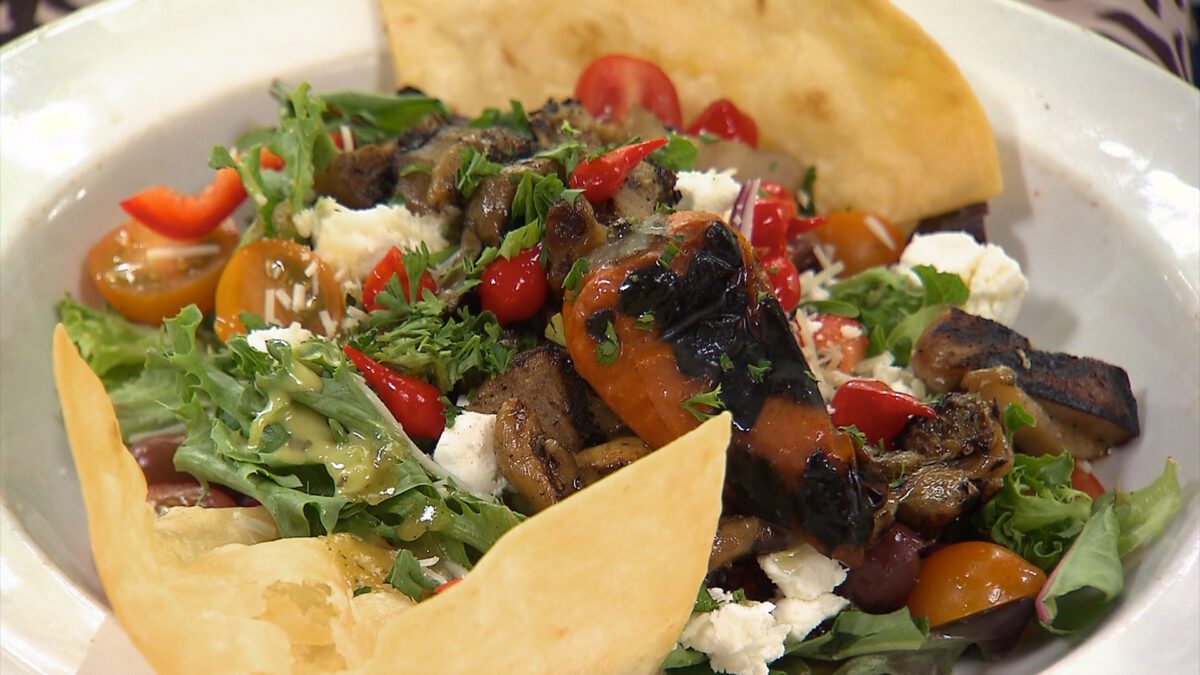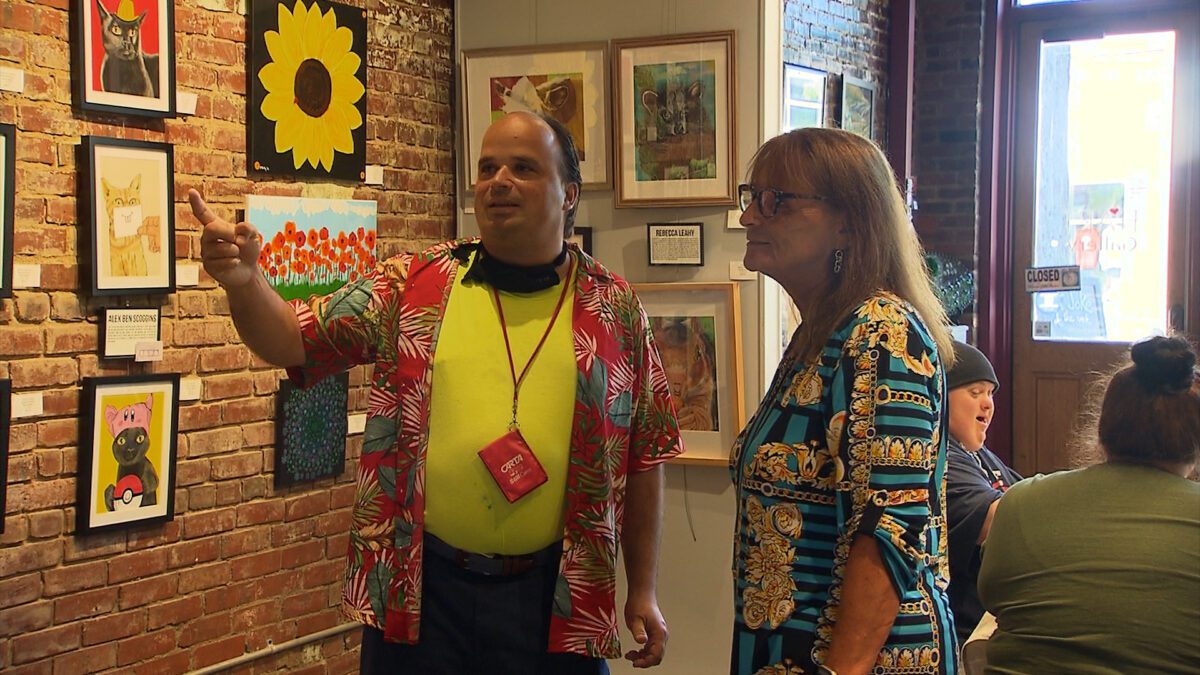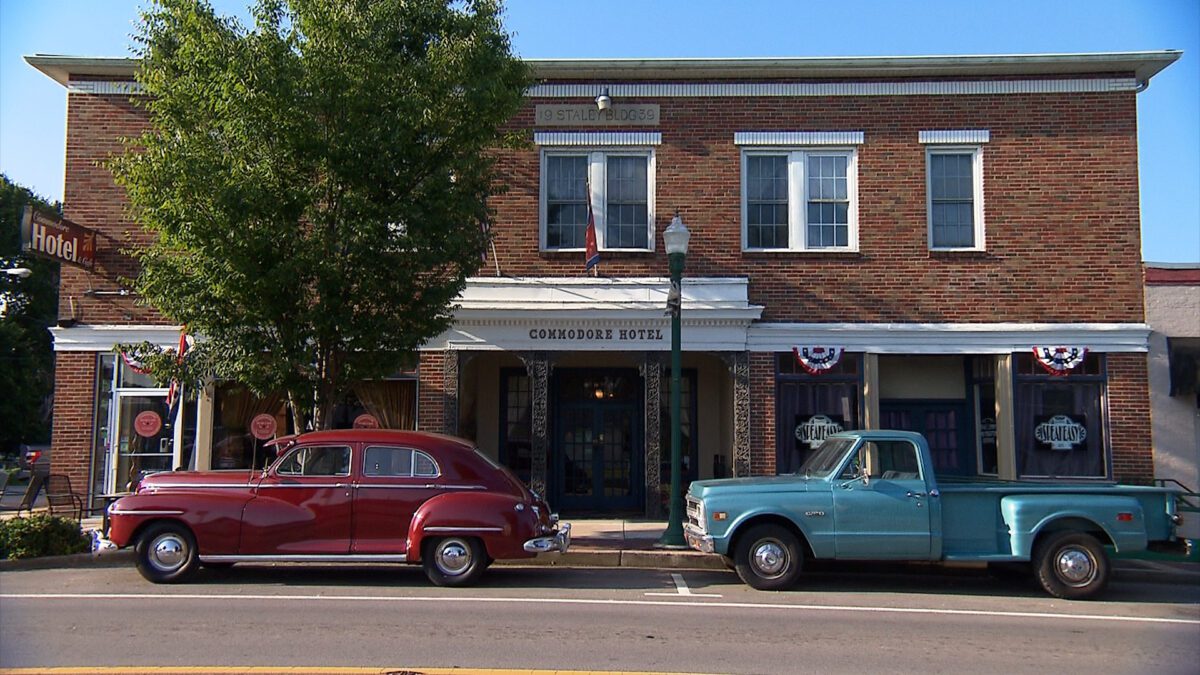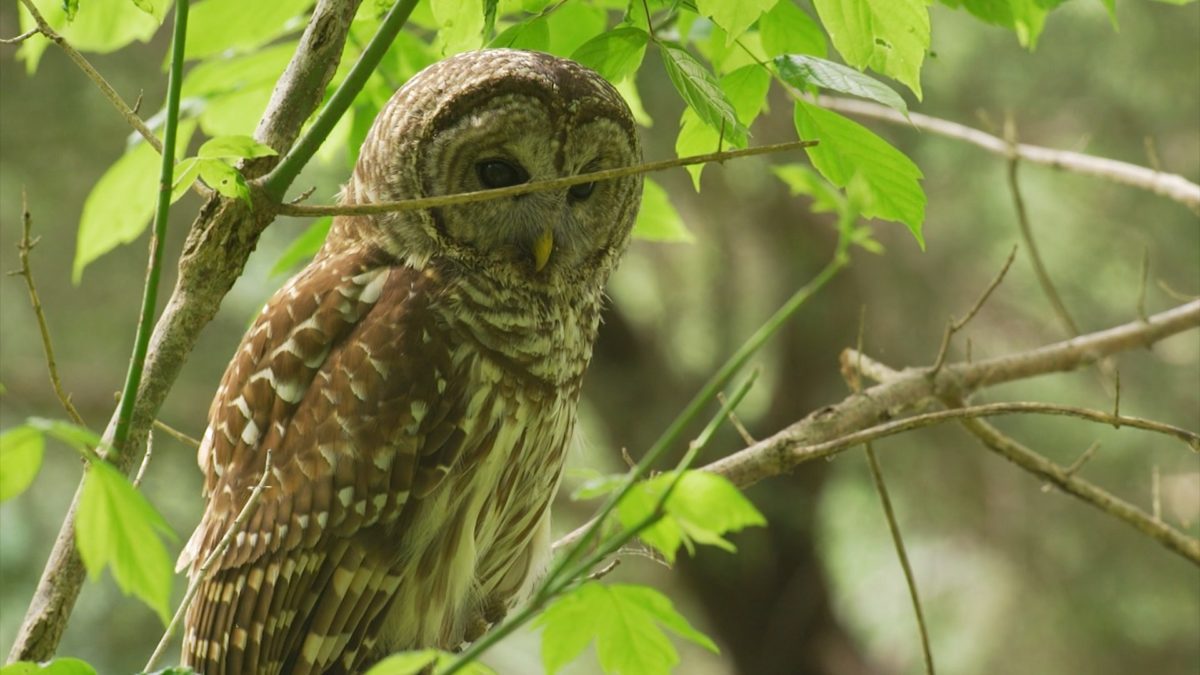Episode 3629
Don't have the PBS App? Click Here
Episode Transcript
- [Announcer] "Tennessee Crossroads" is made possible in part by... - [Phil] I'm Tennessee Tech President Phil Oldham. Here in Cookeville, Tennessee's college town, we are bold, fearless, confident, and kind. Tech prepares students for careers by making everyone's experience personal. We call that living wings up. Learn more at tntech.edu. - [Joe] This time on "Tennessee Crossroads," we head to a Sewanee dining destination called La Bella Pearl, then explore the healing power of art in Chattanooga. We'll discover how an old bank became a cozy hotel in Linden. Finally, take in some serious bird watching at Nashville's Radnor Lake. Hi everybody, I'm Joe Elmore. That's the line-up for this edition of "Tennessee Crossroads." If you exit I-24 at Monteagle, you could turn left and enjoy some great hiking at South Cumberland State Park. Or, if you're hungry, you could turn right towards Sewanee and enjoy a surprising fusion of Mediterranean and American cuisine. Folks come up here to Monteagle Mountain a few miles from Sewanee for different reasons. Some come to hike on one of the many hiking trails, others come just to relax in a vacation rental. Still others come here to eat, thanks to a place called La Bella Pearl's. La Bella Pearl's offers a fascinating fusion of Mediterranean and American cuisine; a combination that's attracting locals and visitors alike. The menu is the brainchild of chef and co-owner Tom Anderson whose first food memories were a visit to a country club his grandmother co-owned in South Florida. - As a child, I used to run through the kitchen and tasting stuff and getting smacked and so food has always been a part of my life. - [Joe] A life dedicated to crafting gourmet dishes and restaurants throughout the US and the Caribbean. After several stints in Nashville Tom moved to the area and partnered up with another local food veteran, Cynthia Krueger. - He has professional training. I just have a lot of years on my feet. - [Joe] In July 2020, Tom and Cynthia assumed ownership of this place, confident that they had the right stuff to make it work. - How you guys doing over here? Oh, I'm good. Tom had a huge following when he came up here and I had a huge following. And it's just we've really never lacked for customers. - [Tom] We are both passionate about what we do and of course, you know, you have that little ruffling going on sometime, but it's all in the best interest of the business and maintaining that consistent quality in our food. We do it right. This is Halloumi cheese from Cyprus. We cook from scratch. Everything is made up in-house from fresh ingredients. It makes you fall in love with food. - [Joe] The restaurant has both lunch and dinner menus. We joined the Friday lunch crowd and the first off for many folks is this colorful antipasto bar. - [Tom] It's a Mediterranean antipasto salad bar. - [Joe] It's beautiful. - [Tom] It has all the favorites from the Mediterranean with inclusions of some American. - [Joe] In the kitchen, Chef Tom performs his culinary magic with non-stop precision, creating lunchtime favorites like garlic, shrimp and panchetta with linguini, whiskey run, which is a chicken breast and baby bella simmered in whiskey wine glaze. Other favorites are the wild caught snapper filet covered in lemon tomato sauce. Then there's the signature of flatbread pizza, not to mention assorted sandwiches, salads and soups, including Mediterranean-style minestrone. - [Cynthia] You have to love what you're doing. You know, if you're in the kitchen as a job, you'll never make it. You have to love and have a passion for food. - [Joe] While La Bella Pearl's has a strong local customer base, word has spread to cities like Huntsville, Atlanta, and of course Music City. - [Tom] We have a lot of business out of Nashville. We even have people who fly into the small airport just to dine with us. It's nice to see you guys. And one of the things I do, I manage to go out and touch base with my customers to make sure they're okay, they're doing fine, everything tastes great. And I think that's part of having a restaurant. You gotta touch base with your customers. - We love Chef Tom and Cynthia. They're like family. It's like coming to somebody's home and just joining 'em for a great meal, a much better meal than we could cook at home, for sure. - [Joe] And no restaurant family is perfect without a support staff that shares the owners' vision. - We have such a good staff and people that can relate to 'em and our staff remembers their names, remembers what they want. - Everyone's really friendly, so it's like a party, isn't it? - [Joe] A party for the pallet? Well, local customers seem to think so. And that's what it's all about for someone like Tom Anderson, a man who's craving for culinary perfection is a total way of life. - [Tom] It's like a high, you know, you take the raw ingredients you create this wonderful dish, your customers love it. What more can you ask for? - Art is more than something you hang on your wall. It has the power to heal and change lives. Laura Faber takes us to a gallery in Chattanooga that offers some impressive art with a heart. - [Laura] It's an eclectic mix of creativity that happens on a daily basis. - [Ellen] They're working artists. There are, there are 74, I believe, artists right now who have art for sale. - [Laura] In downtown Chattanooga every Wednesday and Thursday, artists gather to work, artists like George Monds. - [George] I'm a mixed media/celebrity artist and I draw different art. I do park, culture art, I do scrap art, I do abstract art, all sorts of types of art, which are different patterns. Elvis, I've done Led Zeppelin, I did Rick Ross, Mel Gibson in Braveheart and Queen Elizabeth. - [Laura] George started coming here 11 years ago when he was homeless and had nowhere to go. The ability to create art inside this safe space saved him. - It's helped me to ease, ease my mind, occupy my time and inspiration. It helps me in all different areas of my life. - [Laura] He's here today planning his upcoming exhibit, getting a free meal, visiting friends, he considers family and getting ready for payday. - [Laura] Have you sold any art from here? - Yes, a lot. - The Hart Gallery is a gallery with a mission founded by Ellen Heavilon in 2009. - [Ellen] It was to try to get people that don't have worth or feel like they don't have worth an opportunity to realize they do. - This stone pillar was how it all started. This was Ellen's inspiration for the Hart Gallery, a piece of public art made by Chattanooga's homeless. Ellen couldn't get the pillar out of her mind. What if she provided art supplies and allowed people to dabble and create? Art had helped her after the death of her mother and then again after a bad breakup. - [Ellen] I'm not an artist, but being able to create and let that darkness be filled with something of light, I think, was the beginning of Hart Gallery. Art helped me. I wondered if it could help somebody else? And so the gallery was born. - [Laura] The Hart Gallery started as a place for the homeless, but has grown, and its artists include domestic violence survivors, those with mental illness. veterans, people with disabilities. They are all working artists. The director of the Hart Gallery, Courtney Chandler says she and her staff help them submit work for shows, create portfolios, and offer ongoing classes so they can build their skills. - Beyond that, it's a family for a lot of our artists. It's a space that they know questions can be asked and answers will be received. They might be connected to resources. There's a hot meal that happens, but also that their worth is on display. You know, I think when it's payday Friday, that's some of the most joy that we see because individuals see that what they create is worth something. - [Laura] What you see hanging on the walls of the gallery is just a sliver of the art that's available and for sale. They have an online catalog as well. Indeed, artists keep 60% of what they sell. 30% goes to the gallery's costs and 10% go to the artist's charity of choice. - The money that's coming in through our art sales, it can change lives for a lot of our artists. Sometimes it means they pay the rent this month or it means there's a little extra for groceries. - [Laura] The work is beautiful, the stories behind the work even more so, like the tactile paintings of Erica Birch, a survivor of physical abuse and mental illness. She was just accepted to show her work at a for-profit festival. Or this jewelry artist, a survivor of abuse. - Isela is one of our jewelry artists, who has taught classes to other women and who recently received a grant for $10,000 to write a children's book, which is just being published here in two different languages, "I Will Always Be Right Here" about her relationship with her dad. - [Laura] The Miami Land Showcase is an exhibit for artist Bill Sera and though he's been creating art on and off for 18 years, he struggles with trauma from past child abuse. The Hart Gallery gave him a chance to keep focused, evolve, and grow. - It helps me to deal with my life's problems, process things you know, both good and bad. This is me sharing my life with my fiance, Susie. My childhood memories, childhood dreams of me being born and raised in Miami and... - [Laura] Sometimes a second chance is enough to change a life, an opportunity to be seen. Chattanooga's Hart Gallery is doing just that and offering gorgeous artwork at the same time. - [Courtney] The first time an artist sells something and that first paycheck, you know, regardless of the amount it's the fact that someone felt that their work was good enough to take home to their own home. I think it's a huge, huge thing. - We can't save every person that's homeless. We can't make a difference in every homeless person's life. But what we can do is offer an opportunity through art. - Thanks a lot, Laura. You know, judging from the name of our next story you might think we took a trip to the coast, but the Commodore Hotel isn't near the ocean. It's in the landlocked town of Linden. Cindy Carter met the couple that refurbished a dilapidated old bank and turned it into a destination fit for, well a commodore. - [Cindy] When the weekend rolls around in Linden, Tennessee, you'll need to follow State Route 100 to the town square, hang a right at the classic car, walk past the Minnie Pearl statue and make a hard left, when you hear the music play. ♪ Country roads ♪ ♪ Take me home ♪ That's when you'll know you've reached your destination, the Commodore Hotel, a historic hotel that has reemerged as the place in Linden to stop in, stop by or spend a night or two. - And there aren't a lot of historic hotels left. They've been, especially in small towns, they've been knocked down because there was no business. - [Cindy] Not here, not anymore. Business is back at the old hotel thanks to owners Michael and Kathy Dumont, who fell in love with the Commodore in 2004. - No intention of ever running a hotel. We were gonna renovate it and turn it over to an operator and that was our plan. And you know, things change. - [Cindy] Boy did they. After years of disregard and dilapidation, the Dumonts turned the hotel and Linden into a destination, like it was back when the town was a frequent overnight stop in between Nashville and Memphis. - [Michael] We have stories of Elvis coming through here, and Johnny Cash and... - [Kathy] Yeah, yeah. - [Michael] So that's awesome. Elvis supposedly had his haircut cut here in town one day. - It was a shave. - Oh, it was a shave. - Yes. - [Cindy] The original building was built in 1939 by local businessman, Robert Staley, who ran the hotel and a cafe until he passed away in the 1950s. - [Kathy] It went into disrepair for about 20-25 years and then we bought it. - [Cindy] Bought it and slowly brought the hotel back to life, much to the great interest of the locals who were understandably curious about these strangers from the northeast. - The town embraced the project and us at that time because while we were renovating, my whole job basically was my days were spent touring people around. The local townspeople and everything would come to town. They would say, "I'm so glad that you're saving this." - [Cindy] And the Dumonts wanted to save as much of the original hotel as they possibly could, while modernizing it to keep their guests comfortable. The Commodore's lobby just feels like something out of an old movie or television show. Behind the front desk the restored staircase leads to the second floor guest rooms and no two are exactly alike. - [Michael] Everything in the rooms is pretty much original. - [Kathy] Right. - [Michael] There were four bathrooms up there for 14 rooms when we first bought this so we left those original bathrooms 'cause they're quirky. - [Cindy] Rest assured, each bedroom now has its own unique bathroom and offers its own unique experience, like the Commodore's Quarters, the nautical-themed room like the hotel is named for, not this Commodore, but this one, Commodore Oliver Hazard Perry, a hero from the war of 1812, or the Newport Suite, which pays subtle tribute to Commodore Perry's hometown of Newport, Rhode Island. The Dumonts can also customize the rooms with birthday, wedding, or other celebratory extras. The Commodore Hotel's footprint is actually larger than this building. There are 11 rooms inside the original hotel, but just a few steps down the sidewalk, there are nine more renovated rooms inside what was once the town's boarding house. And a little further, on top of the old bank building, there's a loft space, bringing the total to 21. Yes, the Commodore does stretch out a bit along Main Street, but that gives guests an opportunity to dive into Linden's shops and businesses that have popped up around the town square since the hotel reopened. - [Michael] You know, it wasn't an easy path 'cause when we opened this thing up, we had no goodwill built in. It wasn't a tourism destination and so it took us a long time to get interest. A lot of things happened, some organically, some were forced. - [Cindy] That's because not long after the Dumonts moved to the area, a recession gave Linden the distinction of having the second largest unemployment rate in the country. There were few jobs, few visitors, and plenty of boarded up buildings. A little Linden reinvention was in order and the hotel's reinvention was the start. - So to have a 24/7 presence in a small town is actually a real benefit to the local community and the local business community. - [Cindy] Now, the small town is once again a stop for folks who want to get away, enjoy history, appreciate art, maybe even fish or kayak on the nearby Buffalo River, all of which the Commodore tries to facilitate. - [Kathy] People from the big cities, we've got, it's peace and quiet. Get away from the city, take a breath, lower your blood pressure. - [Cindy] And the Commodore Hotel is also, once again, a place where locals can gather to mix and mingle with those big city folks and each other. - [Kathy] We have our speakeasy or bar lounge and then we also have a restaurant, which is open for lunch and dinner on weekends. And we have live music on Friday and some Saturday nights. ♪ I think I could stay with you ♪ - [Cindy] So if you want to join in on the fun, you don't really need directions. Once you get to Linden, it's easy to spot the Commodore Hotel. It's the place that looks like history, but feels like home. - Thanks a lot Cindy. You know, a few years back, Will Pedigo joined a group of birders at Radnor Lake State Park as they documented the spring migration. But as he found out, Radnor Lake is a premier habitat and refuge for birds all year long. - [John] Radnor Lake is a real treasure. It's just such a jewel to have in an urban area. It's just fantastic. It's kind of an oasis in an area that's relatively urban. You not only have the lake, you have creeks that run through the park, you've got the trees, so it's just a a magnificent habitat for all kinds of birds. - [Will] On a Wednesday morning in late April... - Where'd Cindy go? - Right here. - ...John Kell and members of the Nashville Chapter of the Tennessee Ornithological Society can be found at Radnor Lake State Park. They'll be looking and listening for birds making their spring migration. They'll tally up what they see. The counts will contribute to the study of migration trends, but participants are here because they want to be. - Here we go, let's see what we'll see. - [Guide] Right now we're in peak season. Right now is our Super Bowl for the year. - [John] Tennessee singing up high. - [Guide] Birding is the main reason Radnor Lake was saved in 1973 as the state's first Natural Area. That should be the Acadian fly catcher. Listed as one of the best sites to view birds in Middle Tennessee on an annual basis. The birding group is the soul of Radnor Lake. It is what we are about. - Oh great, right above us. - I really enjoy coming out to these walks because you kind of really never know what you're gonna see or hear. There's many birds that winter in Mexico, Central America, and South America and this is the time of year that they come back north. - I have been interested in birding my whole life, but right now I just decided to actually go looking for birds instead of just watching 'em in my backyard. - [Guide] That's the Kingbird, the Eastern Kingbird. - I've been coming up to Radnor Lake for the spring walks for about 15 years. It's one of the premier birding spots not just in Nashville area but even in throughout the state of Tennessee. It's almost like hunting without the gun, because you've got your binoculars and it's a way to meet people who have similar interests. - [Birdwatcher] If you enjoy nature, you're gonna enjoy coming up because you're gonna be out in such a beautiful environment. And even if you don't see birds, you're just gonna you're gonna enjoy being out for a walk in the morning. - [Will] Radnor Lake State Park was named State Park of the Year in 2015. That's the same year they opened up the Barbara J Mapp Aviary, which houses birds of prey which have been injured in the wild and it serves as an educational resource for the community. - How long have you had the birds? - [Conservationist] The aviary is here to educate people on the conservation of wildlife and just to teach them about some of the more common birds of prey that they'll see in their neighborhood. - [Guide] This venue is unique. It's location's unique. You gotta hike here. It's a mile and a quarter walk from the visitor center. This is not a pull-up drive through, get your program experience and leave. It's a hiking destination. - [Conservationist 2] It's a red-tailed hawk. She's a non-releasable hawk due to a permanent dislocation from a broken wing that didn't heal correctly. - [Guide] They're one of those things that when people see them, that's often from a distance. They like them, but they don't fully understand them. It's a way that we crack the door open to making people understand their importance, the importance of protecting their habitats. They're the alarm signal if things are good or bad for us. So when you have birds that are injured, cannot be released in the wild, it is a natural fit for these programs. - Perch. All the birds that we currently have are non-releasable due to a permanent disability. Step up. So we'll never have a bird that can be released back into the wild. If it can be out there and survive on its own, it should be. So all of these have already been through the wildlife rehabilitation process and they were deemed non-releasable and appropriate for education. - [Guide] We use those birds in two ways up here. Just for viewing, we have five aviaries that are set up for viewing by visitors. Our preferred method is doing what we call a glove program. They put the bird on a glove and they can interact with the park visitor, ask questions, they can take photographs. It's one of those things, It's engaging them at a new level. - [Conservationist] Hopefully visitors will come away with a new appreciation for wildlife. It will get people thinking about environmental conservation in general and how we affect wildlife and the environment. - [Conservationist 2] And you just want people to feel comfortable about being able to come out in nature and be able to see birds, hear birds, and enjoy them. - All right, with that we gotta say goodbye after a few brief messages. First of all, try out the PBS video app when you get a chance. Also, check out our website, TennesseeCrossroads.org, and you can follow us on Facebook. Oh and please join us next time. - [Announcer] Tennessee Crossroads is made possible in part by... - [Phil] I'm Tennessee Tech President, Phil Oldham. Here in Cookeville, Tennessee's college town, we are bold, fearless, confident, and kind. Tech prepares students for careers by making everyone's experience personal. We call that living wings up. Learn more tntech.edu.
Tennessee Crossroads
March 16, 2023
Season 36 | Episode 29
Joe Elmore heads to a Sewanee dining destination called La Bella Pearls. Laura Faber explores the healing power of art in Chattanooga. Cindy Carter discovers how an old bank became a cozy hotel in Linden. And Will Pedigo takes in some serious bird-watching at Nashville’s Radnor Lake.




